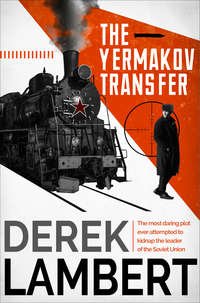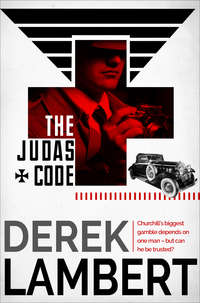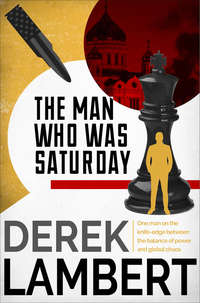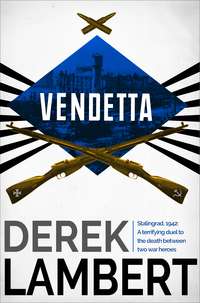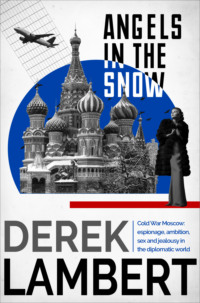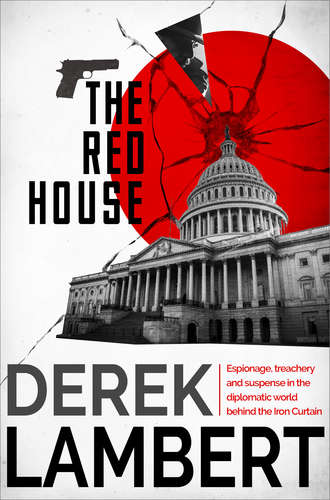
Полная версия
The Red House
She looked down at Georgi the rebel with affection. He is an attractive boy and at least we share bewilderment. And now, I think, a little honesty. She brushed a nipple across his face, felt his sharp ribs, hips, the awakening phallus—more arrogant now than its owner.
Then he made love to her again. Or was it the other way around? Anyway it was even better than the first time.
‘Georgi,’ she said, pulling on her grey skirt and black sweater, ‘don’t you think you should get your hair cut just a little?’
‘You sound like a wife already,’ he grumbled. He lingered on the bed, probably hoping to be caught in the middle of dressing—the conquering lover disturbed. How shallow, how presumptuous, how conceited. Perhaps she should say, ‘There he is, gentlemen, I have just seduced him. He’s all yours.’
She said, ‘I was only thinking of your own safety. The other night a Komsomol patrol grabbed a student off the street and forcibly cut his hair. They also read his notebooks.’
Georgi shrugged. ‘It’s a cheap way to get a haircut.’
‘But your notebooks, Georgi …’
‘I’m not stupid enough to write anything incriminating in them.’ He lit another cigarette. ‘Anyway they probably only did it for a little fun. It’s their job to stop hooliganism. There’s nothing wrong with that, is there?’
Natasha agreed that there wasn’t and began to braid her long shiny hair. She searched herself for the irreparable sense of loss that was supposed to accompany the loss of the maidenhead. She felt only satisfaction and a little soreness.
Georgi continued to lecture. ‘Although there are still changes to be made we’re lucky to be young now in 1968. No Stalin, no Beria, no 2 a.m. knocks on the door. And also we’re just young enough not to have been too badly affected by Khrushchev’s denunciation of Stalin. In 1956,’ he added in case she wasn’t too good on contemporary history. ‘Can you imagine what it must have meant to those kids? Why, once upon a time they used to sing a hymn to Stalin.’ He sung a few bars. ‘Leader, scattering darkness like sun, Conscience of the world, Luminary of the ages, Glory to him.’
They heard footsteps outside and a tentative knock. Georgi leapt out of bed, pulling on undershirt and pants. ‘Answer the door, Natasha. That’ll be Boris and Yuri.’
She smiled at him with maternal indulgence and went to the door.
The two plainclothes policemen pushed past her. ‘Georgi Makarov,’ one of them said, ‘please finish dressing and come with us.’
5
IT was two weeks before Vladimir Zhukov staged his first unspectacular revolt. But the desire to buy was drooling in him. More than thirty years preparation for the impact of bloated capitalism and I am like a kid with five roubles to spend in a toy store.
Valentina observed his craving with contempt. ‘Don’t forget, Vladimir, that it has nothing to do with their system. It’s all a question of natural resources. And the fact that the settlers in America were the toughest and bravest people from Europe. And, of course, they avoided the devastation of the last war …’
‘I know,’ Vladimir said, ‘I attended that lecture, too.’
In any case her nagging was unnecessary. He despised the gluttony of living. But when in Rome … Would it do any harm to taste a little of the plunder? A single orgy couldn’t corrupt. A practical experience of decadent extravagance.
He began gently. At a drugstore on Dupont Circle called the People’s Drug—the name soothed his guilt. But even in this humble American mart the horn of plenty sounded loud in Zhukov’s ears. Stationery, perfume, magazines, paperbacks, ice-cream—pills and potions to ease the punishments of gluttony.
But it’s difficult to spend money after a lifetime of frugality, Zhukov discovered. He bought a comb and a tube of pink transparent toothpaste which Valentina might prefer to her tin of powder. So hard to spend and so easy to pay: no abacus, no hour-long queues, no trips from counter to cashier and back.
Shyly he ordered a cream soda from a day-dreaming Negro girl. Slyly added a dollop of ice-cream. Then furtively treated himself to a hotdog, squirting it thick with mustard, burying the punchy-skinned sausage in green relish; swallowing some paper napkin with his first bite.
The waitress said, ‘You go on eatin’ like that and you’re goin’ to be a plenty sick man.’
The schoolboy Zhukov apologized. ‘I didn’t have any breakfast.’ But his accent defeated and bored her. She moved indolently away, gawky limbed and graceful.
But why feel shame, Comrade Zhukov? Aren’t Muscovites the greatest eaters in the world? Stuffing themselves with creamy borsch, fat meats, black bread, cucumbers, potatoes, the gurievskaya kasha that Valentina cooked so well, the salted pig fat on thick bread that peasants still ate, the finest and creamiest ice-cream in the world. I shouldn’t feel shame at eating these synthetic snacks. He prodded the floating ice-cream with disdain. And a coffee, perhaps, to complete the culinary adventure. The girl who wore a blue-black wig slid him a cup and he experimented with the cushion of sugar and tiny pot of cream as if he were in a laboratory.
As he paid at the cash desk he belched.
He urged himself on past stockades of root beer and Coke, hesitated at male cosmetics. Juices of conceit, long corked, spurted. He remembered women at May Day and Revolution anniversary parties paying him compliments capsuled in bubbles of Russian champagne. ‘You are an attractive man, Vladimir Zhukov. Not handsome, perhaps, but you have strong features and a commanding presence. That is what women like.’ The flirtatious heritage of Czarist sophistry still giggling beneath stern Socialist surfaces.
Zhukov bought some hair dressing said to be enriched with protein and headed back to the apartment with his guilty purchases in a brown paper bag under his arm.
So ended the first unspectacular revolt.
The second followed a few days later. Because the lust had not been sated, the experience of decadence not fully assimilated.
In his West German bug Zhukov drove first to Hecht’s on 14th and G where he had been told by colleagues that there was many a bargain to be had and no Russian need feel too badly about distributing his puny allowance there because didn’t the underprivileged and victimized Negroes shop there? They certainly did, Zhukov discovered; and so did many whites who had once shopped at Garfinkels before glimpsing the dark waters of recession beneath the tissue ice of prosperity.
Again he was intoxicated by the profusion of merchandise. Broad silk ties, corduroy and soft suede jackets, fragments of lingerie, shirts which only homosexuals outside the Bolshoi in Moscow would have worn, novelties, Valentine cards already, drapes, perfumes … The disinclination to spend was still strong in him; but his arms were growing longer, his pockets shorter.
In Hechts Vladimir Zhukov, uncomfortably aware of his styleless clothes, bought a wide silver tie lined with blue satin and a broad leather belt with a peace buckle, designed to hold up nothing (except, perhaps, a slumping belly) but which might come in handy for beating a wife. Or vice versa.
The young man who served him confided that the belt might be the basis of a new image for Zhukov. ‘We don’t want to draw attention to the approach of middle-age, do we, sir?’ He withdrew his hand from Zhukov’s sweating nylon shirt with alacrity.
Outside Zhukov observed the droppings of soiled snow—and heard the scrape of old women’s shovels on the sidewalks of Moscow.
He climbed into his stone-coloured Volkswagen and drove to a supermarket. Its cornucopia was the biggest shock of all. Not just the frozen, packaged, price-cut, sliced, chopped, condensed, fortified, concentrated, dehydrated, evaporated, regimented, abundance of it all. No, it was the permutations: the calculating ingenuity of choice: simple selection grated hopefully into shreds that might appeal to different ages, sexes, races, colours, types. An indulgent carve-up of what had once been ordinary shared hunger.
Take olives, for instance. Not particularly favoured by Vladimir Zhukov; nevertheless the pure stony fruit of history, to be eaten with goats’ cheese beside a hill where shepherds rested under the olive trees’ undistinguished branches. Here, in an avenue of cartons and deep-freeze troughs, they rested in specimen bottles: black salad olives, manzanilla olives stuffed with sweet peppers, water, salt and lactic acid, pitted olives, Spanish olives stuffed with pimentos, giant Californian olives …
Influenced as always by old movies, Vladimir Zhukov had always fancied orange juice with his breakfast—prior to coffee and toast and kidneys served from a silver platter. But perhaps he was old-fashioned. Frozen concentrates of lemonade, pink lemonade(!), grape, apple, iced tea, Hawaiian punch, peach, peach and orange. And there at the end of the surgical trough the cold cylinders of pure frozen orange juice.
He walked away with nothing, selectivity battered senseless.
But I will buy some sausage, he thought. The sausage that as a student I used to wolf between dry bread while the vodka bottle circulated. Bologna, liverwurst, salami, turkey salami, blood and tongue, corned beef, chicken loaf, olive loaf, hot Italian loaf …
‘Some sausage, please,’ he said to the scrubbed young man in the chef’s hat.
‘What kind of sausage?’
‘Any kind.’
‘You got to make the choice, buddy. It’s you that’s eating it, not me.’
Zhukov pointed wildly at a gnarled pink forearm of meat.
‘How much do you want?’
Zhukov indicated with his hands—‘About that much’—popped the sausage into his still-empty shopping cart and hurried away to rally his powers of choice beside the mixes—whisky sour, pussycat, daiquiri, gimlet, cranbreaker, bloody Mary and Tom Collins—stacked beside root beer, birch beer, spruce beer, grape soda, black cherry soda …
He rested there, drunk with choice, as Nicolai Grigorenko hove past, his basket-on-wheels stacked high with decadence.
‘Greetings, comrade,’ Zhukov said, sanctimonious about his single tube of sausage.
Grigorenko turned as quickly as a man going for a gun. Alarm, suspicion, menace; then a blush of guilt on his drooping face. But he attacked just the same. ‘What are you doing here, Comrade Zhukov?’
‘Observing the fleshpots of Capitalist degeneracy. And you, comrade?’
The Growler faltered. ‘Just doing a little shopping for one of the counsellors.’ Inspiration assembled slowly. ‘He’s giving a party for some French diplomats. You know how they like to eat,’ he added hopefully.
‘I do indeed, comrade.’ He appraised Grigorenko’s basket of loot. ‘How will the counsellor serve aerosol shaving cream?’
‘That is for the counsellor himself. It is his only weakness.’
‘If American shaving cream is his only weakness then he is a very fortunate man.’
Grigorenko nodded heavily, already planning further explanations and revenge. But for the time being I’ve got you on the defensive Zhukov thought with satisfaction. It was quite an achievement to score over an officer of the K.G.B., however slight the indictment.
He picked up a small cardboard canister from Grigorenko’s pile. ‘Lemonade, eh? Another Gallic speciality?’ He read the label and smiled. ‘I’m pleased to observe that it is pink lemonade, Comrade Grigorenko.’
Grigorenko growled and departed. With an easier conscience Zhukov began piling many permutations of decadence into his own basket. Starting with chunky blue cheese dressing.
The Embassy was jumping but the ambassador didn’t jump with it. He had survived too many international crises in his 16th Street kremlin to be over-excited by the seizure by the North Koreans of the American spy ship Pueblo; besides he had a heart condition.
The trick was to smooth each crisis into the day’s working routine that began at his desk at 8 a.m. and finished at midnight. Never agitate yourself—particularly in public—like Khrushchev or a senator exposing corruption: composure was one of the essences of diplomacy, even if it wasn’t always appreciated by the hawks of Moscow. But Soviet diplomats were at last learning the sophisticated approach, and he, Valentin Zuvorin, considered that he had overtaken the Americans in the delicate art. A smile, a half-truth, a witticism: a swift rapier thrust of assertion through lowered defences. Thus one President had been moved to call him a liar, another had told him to ‘quit horsing around.’ Small victories of behaviour—even if policies had been defeated.
Zuvorin picked up the phone in his high-ceilinged, somewhat Czarist office, and called the Press Counsellor. ‘What’s Moscow putting out on the Pueblo affair?’
The counsellor began to read a Tass report of an article in Izvestia. There was the usual line on American aggressive intent and expansionism plus a suggestion that the American President was using the incident as a pretext to call up reserves for Vietnam.
‘Thank you,’ Zuvorin said, as the predictable tirade continued.
‘But …’
Zuvorin hung up. Competent of its kind and ineffectual. The language of protest blunted by repetition. Even the outrage over Vietnam had lost its impact, like the lingering atrocity of the war. If only the propagandists would seek some diplomatic style.
He sipped his lemon tea and scanned the dispatches from Moscow. Aid pouring into the Arabs who would squander at least half of it; such waste because of political necessity. During the Six-Day War Zuvorin had privately enjoyed some of the jokes. ‘Come to Israel and see the pyramids.’ He smiled again now: you had to admire the flyweight prize-fighter felling the heavyweight. The rapier over the machete. Not that Valentin Zuvorin doubted the Kremlin policy in the Middle East because ultimately it would be a victory for Socialism. And he believed steadfastly in Socialism.
And now Czechoslovakia. Antonin Novotny had been ousted from his post as first secretary of the Party—a job he had held for fifteen years. Soon I shall have to lie again and eventually my lies will be exposed. Because the Czechs will try to break away and they will have to be taught a lesson. Zuvorin admired their spirit; but, sadly, blood had to be spilled, tissue destroyed, in the ultimate surgery on Mankind.
Although, in the camouflaged recesses of his soul, Valentin Zuvorin loathed and feared aggression, as anyone who had lived through the siege of Leningrad well might. He endured the humiliation of the Cuban missile crisis because a world war had been averted; he secretly rejoiced when the Arabs capitulated to the Jews, when the Koreans came to terms; he grieved before sleep at the plodding tragedy of Vietnam. He envisaged a time—not in his day—when the world solved its problems through diplomacy. Provided the settlement favoured Socialism.
The ambassador’s philosophies were complicated by one particular factor: he had come to regard Washington as more of a home than Moscow. He enjoyed the company of many of its inmates and considered John F. Kennedy to have been the finest man he had ever known. Such was his easy absorption into the Washington scene that he had been summoned to the Kremlin to explain his attitudes. How had he arrived at the conclusion that the President did not want to escalate—even the new phraseology of war was ugly—the Vietnam hostilities into an all-out attack on Socialism? ‘Because, gentlemen, I know the President and, with respect, you don’t.’ So Soviet and American leaders had subsequently met and now the Kremlin was willing to talk about missile disarmament.
A small aching protest behind the sternum. Zuvorin took a white tablet (American) with his last sip of tepid tea.
How much longer before his recall? Until they found another man as fluent and deceptively amiable in his conversations with the Americans as Valentin Zuvorin. A difficult task, the ambassador flattered himself.
Within limits he enjoyed the socializing. The guarded banter, the outrageous flattery. ‘You are so suave, Mr Ambassador. So witty—so unlike so many other Russians …’ Hand to the mouth at the Martini indiscretion. Himself—he only took two drinks, no more. But, of course, flattery, however flagrant, always worked. He cherished his reputation for cultivated conversation; his laugh, he had been told, was a pleasure to hear.
(How dreary, by comparison, were the parties given by his Socialist allies. Valentin Zuvorin ducked the gaze of V. I. Lenin high on the wall.)
Black ties and banquets and cocktails. Such dismay when he declined vodka—‘I bought it especially for you’—and took whisky. World affairs and American politics bundled together into a hub of parochialism in which treaties and pacts were as casually treated as village-green boundaries. Lovely girls with haughty faces offering their bodies, young men their souls. And the official spies with medals jingling, as subtle as tanks. And the spies spying on the spies; always a little obsequious, just as blatant with their trained ears and stilled tongues. And others less obvious.
Such a magnificent, incongruous phenomenon, this Washington. All its palaces of power, its burrows of bureaucracy, archives of history, vaults of intrigue, all clustered within a few blocks of celebrated architecture; squalor halted around the edges of the village green. The White House and the Capitol, the thrones of Western power, overlooking the garbage cans of domesticity.
Often Valentin Zuvorin felt sad about the American people. An emotion dangerously akin to sympathy. Their patriotism, their naïve disgust at corruption in their midst, their bright scalpels of sincerity slashing ineffectually at their cancers, their decent inability to crush dissidence as we crushed the Hungarians.
Most of all Zuvorin admired their unequivocal belief that they were right. That was their weakness. The crusaders had lost and they would lose.
The ambassador sighed. He picked up his agenda for the day. While his aides digested official anger over the Pueblo incident—the Americans’ crime, Zuvorin privately thought, was getting caught—he would interview a newcomer to the flock. Vladimir Zhukov.
He replaced his diplomatic mask and looked Lenin straight in the eye.
The ballroom at the top of the marble stairs was empty except for a grand piano and a couple of chairs, the gloom heavy behind the half-closed drapes on the tall windows.
Zuvorin explained, ‘I sometimes have informal chats here because it’s cooler. Did you know,’ he asked chattily, ‘that our embassy is said to be the hottest building in Washington during the winter? About eighty degrees, I believe. It’s too hot. But, of course, we Russians are used to heat indoors in winter.’
The ambassador appraised Zhukov. A good servant of the Party, he judged. Perhaps a little too honest with himself; a mouth that betrayed a poetic soul. Although what the hell was wrong with a poetic soul from a country that had produced Tolstoy, Tchaikovsky and Pushkin, Zuvorin couldn’t imagine. He was pleased that they were now sending him people instead of puppets.
Two men who had survived war and purges; one senior because of circumstance and ambition. To me he is still young, Zuvorin thought. To himself he is hopefully young. To the young themselves he is an old man—and I am senile. ‘And how are you enjoying Washington?’
‘It’s interesting,’ Zhukov said carefully. ‘Much as I imagined it.’
‘But still a shock to the system … not quite as it is painted to us before we leave the Soviet Union?’
‘Not quite.’
‘You are a good diplomat, Vladimir Zhukov.’
‘Thank you, sir.’
Not quite as it is painted! Such ludicrous understatement. Why couldn’t the two of them share the truth? The oppressed masses smoking cigars and running two cars. That’s what hits you. We both know it, so why not be honest with me? But he was being naïve to expect such candour between a second secretary and an ambassador. He put the two chairs in front of the grand piano because it was an unlikely nest for a microphone. Not necessarily an American microphone: there were plenty of Soviet bugs around the place. It was part of the system. Why not? if you had nothing to hide. On the other hand you could hardly expect junior members of the staff to be expansive within such a system. ‘What,’ Zuvorin asked, ‘has impressed you most about America?’ The puppets usually denounced the exploitation—before he stopped them.
‘Their houses, I think,’ Zhukov said.
‘The houses? In what way?’
‘The way they live in units. Isolated, if you like from each other.’ Zhukov felt his way with caution. ‘I just don’t see how they can ever understand us. The communal soul of Russia, I mean. Their characters are so different, so self-sufficient …’
Together they saw the hibernating family and friends around a stove in a wooden village hut; the city apartments with their communal kitchens and bathrooms; the old and the new settings of shared gaiety, love and strife.
‘An unusual first impression, Comrade Zhukov. But I don’t think for one second that they want to understand us. It is we who should try and understand them—it is we, after all, who are trying to spread Marxist-Leninism throughout the world.’
‘You are right, of course,’ Zhukov said. ‘But it seems a shame …’
‘I believe,’ said Zuvorin, skirting the tortuous alleys that might lie ahead, ‘that you speak excellent English. That is how you came to be given this post. Where did you learn the language? I must confess I am a little jealous.’ He waited.
‘Your English is perfect,’ Zhukov said.
Zuvorin nodded happily. He did enjoy flattery. But at his age was it not forgivable?
‘I studied languages at the university,’ Zhukov said. ‘Then I became an interpreter in the Army. I improved my English when we met the British and Americans in Berlin.’
‘Ah so. Our allies. They should have followed Patton’s advice. Where would we be then, comrade?’
Zhukov said he didn’t know where they would be.
‘So that is all that has impressed you about Washington—the houses?’
‘I have, of course, been struck by the standard of living.’
‘Of course you have,’ Zuvorin murmured. He offered Zhukov a cigarette. Sometimes he was surprised that more of his staff didn’t defect, because he knew perfectly well that many of them contemplated it when they first tasted the milk and honey. But they were deterred by family hostages ‘held’ in Russia, by language difficulties, by the knowledge that after the headline glamour of defection they would be misfits. Also loyalty was encouraged by promises of promotion to other Western fleshpots; and when they visited the Soviet Union they were big men, regarded with as much awe as football players or movie stars. But, the ambassador sensed, Zhukov’s temptations would be different: he would taste and savour freedom of expression. And he spoke excellent English. A man to watch; but, of course, he was already being watched as, perhaps, was Valentin Zuvorin himself.
‘I have formed the impression,’ Zhukov continued, ‘that they are a nation bent on suicide. Too much food, too much smoking, too much alcohol, no exercise. And,’ he added, ‘I have been very impressed by the fact that they never walk anywhere. Then they wonder why so many die from heart attacks.’
Zuvorin massaged his chest with two fingers and stubbed out his cigarette. Officially he was supposed to suffer from asthma. He managed a deep melodious laugh. ‘You are an original man, Comrade Zhukov. A dangerous thing to be a few years ago. But now many things have changed. Your originality—and your excellent English—has been recognized. You are to be promoted. Although you will have to wait some time before you officially become a first secretary.’
Zhukov expressed surprise. ‘I am honoured. But I have only been here three weeks …’
‘You have been fortunate,’ the ambassador said. He stood up and paced the gracious room. ‘A first secretary called Tardovsky has been recalled to Moscow at very short notice. A question of health …’ He glanced at Zhukov to see whether he had heard rumours; Zhukov remained impassive. ‘Tardovsky spoke excellent English also. You seem to be the man to take his place.’


